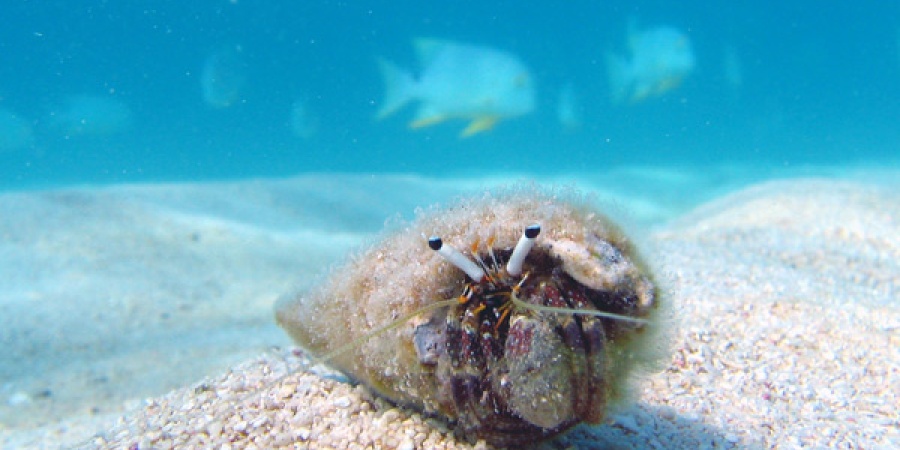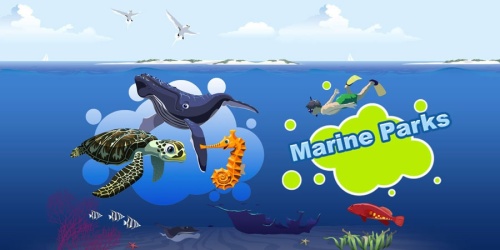
Hermit Crab - Photo Huw Dilley
We can all help keep our marine parks in good condition by: sticking to the rules when enjoying marine parks e.g. never fish in sanctuary zones; notifying Parks and Wildlife if you see marine wildlife in trouble; keeping our marine parks clear of rubbish; and even using less electricity in your homes.
Find out what you can do to become a Marine Park Protector and help to look after Western Australia's unique marine wildlife.
Become a Marine Park protector
- Take only pictures and leave only footprints – leave marine creatures in our marine parks, for all to enjoy. If you pick up a rock or shell, always put it back where you found it, as there is bound to be something living on it or in it.
- If you find a sick or injured animal on the beach, call the Wildcare Helpline on (08) 9474 9055. The Wildcare Helpline provides a service for the public who find sick or injured native wildlife and are seeking advice on where to find care for the animal.
- Help save marine animals from a slow death by picking up rubbish on the beach or floating in marine parks and putting it in the bin.
- Recycle or reuse your plastic bags or, better yet, buy a reusable bag!
- If you're boating in marine parks or visiting an island collect all your rubbish and dispose of it on land.
- Don't let rubbish get washed down the storm water drains and into our precious marine parks. Make sure all rubbish goes into bins for correct disposal or recycling.
- When you're fishing, don't leave bait bags lying around and throw all unwanted fishing line in the bin.
- Fish for the future! Abide by fish size, bag and possession limits set by the Department of Fisheries and help protect our fish, some of which are unique to Western Australia!
- If you're visiting a marine park make sure you 'know your zones'. Some zones are set aside as sanctuaries where you can look but not take (these areas are fantastic spots to go snorkelling as they have especially abundant marine life).
- If you visit areas with corals (like Pocillopora Reef at Rottnest Island) you can collect information for Coral Watch. Visit their website http://www.coralwatch.org/ and find out more about coral bleaching and how you can help monitor coral health.
- Ingredients found in some brands of sunscreen can cause coral bleaching, even at low concentrations. ALWAYS WEAR SUNSCREEN WHEN SWIMMING OUTDOORS. However, if you know you are going to be swimming near corals, ask your parents to only purchase sunscreens that do not contain the ingredients paraben, cinnamate, benzophenones and camphor derivates. These are the nasties where coral reefs are concerned. Several leading brands of sunscreens are environmentally friendly, so some simple choices can help to protect our marine parks and our beautiful reefs.
- You can help protect our marine parks just by switching off lights when not in use and by cycling to school. Carbon emissions into our atmosphere are killing our coral reefs! Our oceans are absorbing the excess carbon dioxide and becoming more acidic. The acid is literally 'eating away' the skeleton of the corals.
How litter affects marine animals
Don't rubbish our marine wildlife!
Many marine animals confuse plastic bags, balloons, bait packets, lolly wrappers and rubber with prey and eat them.
Plastic bags and balloons floating in the water look like jellyfish. Turtles often eat them and choke or starve to death because they have so much plastic in their stomachs.
Seabirds eat polystyrene balls and plastic buoys, after confusing them with fish eggs and crustaceans. This makes them very sick!
Baleen whales such as blue whales, humpbacks and southern right whales take big gulps of water to feed on krill that they filter through their baleen, and may accidentally swallow plastic rubbish when feeding. The plastic stays in their gut and stops them digesting their food, leading to a slow death!
Remember Lovelace in the movie Happy Feet? If animals become entangled in lines, nets, ropes or plastic it can restrict their movement and lead to starvation, infection, amputation and drowning. Turtles, whales, sea lions, seabirds and dolphins may be severely injured and even die if they become entangled.
Marine park rangers from the DBCA's Parks and Wildlife Service help to educate boat users and other marine park users about disposing of plastic bags and other rubbish thoughtfully. Next time you are visiting Western Australia's marine parks or any of the State's many other beautiful marine areas, make sure to put your rubbish in the bin.
Facts about marine litter
- Do you know how long it takes for litter to break down in the ocean?
» Paper bus and parking tickets: 2 - 4 weeks.
» Orange and banana peel: up to 2 years.
» Cigarette butts: 1 - 5 years.
» Plastic bags: 10 - 20 years.
» Foam cups and tin cans: 50 years.
» Aluminium cans: at least 80 years. Plastic bottles: 450 years.
» Fine fishing net: at least 600 years (much longer for heavier nets).
» Glass bottles: 1 million years. - One million seabirds are killed by marine litter every year.
- 100,000 turtles and marine mammals, such as dolphins, whales and seals, are killed by plastic marine litter every year around the world.
- Plastics are the most common human made objects sighted at sea, with 18,000 pieces of plastic litter floating on every square kilometre of the world's oceans!
- Six million tonnes of debris enters the world's oceans very year, weighing about the same as a million elephants!
- More than 260 animal species worldwide have become entangled in or consumed fishing line, nets, ropes and other discarded equipment.
- An astounding 86 per cent of all marine turtles are affected by marine debris.
- Every day ships throughout the world discard 5.5 million pieces of rubbish into our oceans.
- Carbon emissions into our atmosphere are killing our coral reefs! Our oceans are absorbing the excess carbon dioxide and becoming more acidic. The acid is literally ‘eating away' the skeleton of the corals.
